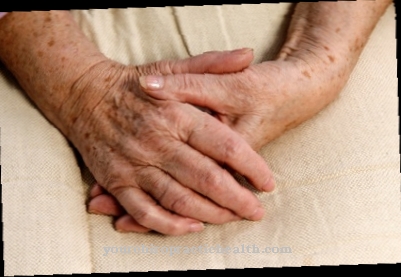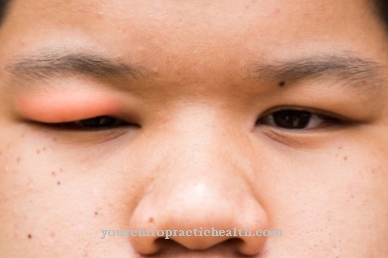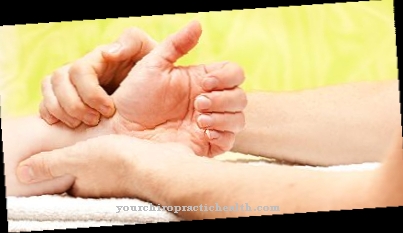Kidney pain are a clear sign that an immediate medical evaluation is necessary. The kidneys are important organs and if they are painful, treatment must be given after the causes of the kidney pain have been clarified.
What is kidney pain?

Kidney pain cannot always be precisely localized because the kidneys are on the back in the flank area and the kidney pain can also be confused with back pain. Back pain can affect the tissue so that it is not clear where the pain is coming from.
Nevertheless, kidney pain is to be taken very seriously, as it can hide serious illnesses. Among other things, it can be inflammation of the kidneys. Kidney pain can also indicate other kidney diseases or it is caused by kidney stones.
Even a simple cystitis can cause such pain. It could also be kidney cancer. Kidney pain is therefore a clear invitation to see a doctor. Because only the doctor can clarify whether it is a completely harmless illness or a serious and serious illness.
causes
Kidney pain always indicates a disease. This can be slightly pronounced and consequently easy to treat. However, it can also cause serious complications and severely impair important kidney functions. Kidneys are necessary for the intercellular fluid balance. Kidney pain can have two basic forms. For one, it can be dull and persistent and is then known as chronic kidney pain.
However, kidney pain can also be colicky with severe pain. If it is colicky kidney pain, kidney stones or ureter stones can be the cause. Spasms or urine congestion can also lead to colicky kidney pain. If the kidney pain is persistent, the kidney corpuscles may be inflamed or there may be inflammation in the renal pelvis.
If pus collects, the cause of kidney pain is an abscess. Other causes of kidney pain can be tumors and injuries to the organ, kidney tuberculosis or malformations of the kidneys can also be the cause of kidney pain.
Diseases with this symptom
- Pelvic inflammation
- Ureteral stone
- Spasticity
- renal colic
- Kidney stones
- Kidney cancer
- Cystic kidneys
- Kidney congestion
- Cystitis
- Urinary obstruction
- Renal failure
- Chronic renal failure
course
Mixed forms are possible in the course of kidney pain. Chronic kidney pain can also lead to colic in the meantime. For example, if it is simply a case of cystitis, it can be treated quickly and easily with medication.
If left untreated, the bacteria can spread and lead to worse illnesses. Eventually, when kidney function is compromised, it affects the entire body system. Even kidney pain associated with painful urination must be treated immediately with antibiotics in order to prevent the course of the disease, which can worsen.
Kidney pain caused by urinary or kidney stones must also be treated immediately. Kidney pain is the body's alarm signal. Their importance must not be underestimated and treated by a doctor.
Complications
Kidney pain can lead to a lack of hydration. In severe cases, dehydration threatens. This is a life-threatening condition that must be treated immediately by a doctor to minimize the risk of irreparable damage. If kidney pain is not treated properly, further illnesses threaten. Kidney inflammation can occur.
If left untreated, this leads to renal insufficiency. One or both kidneys are no longer fully functional, so that a life-threatening disease threatens. The kidney pain can be felt with every step and lead to an impairment of life. Many patients experience side effects when administering medication.
They include vomiting or diarrhea. The kidney pain leads to further complications with and without treatment. They include a fever, convulsions, or chills. You may feel dizzy or confused. Some people experience impaired consciousness or loss of consciousness. The heart's activity is reduced, which leads to a lack of attention or listlessness.
The kidney pain can cause symptoms such as blood in the urine. The urine is produced in smaller quantities, which causes water to accumulate throughout the body. The fear of ultimately being dependent on a donor organ or of having to die is omnipresent for those affected. It leads to disturbances in social life and psychological stress.
When should you go to the doctor?
In the case of kidney pain, a doctor should always be consulted in order to clarify the causes and to avoid further complications. A visit to the doctor is urgent if there are accompanying problems urinating or changes in the color of the urine. Blood in the urine suggests kidney stones that should be checked by a doctor immediately. Otherwise, renal colic may develop, which is associated with severe secondary symptoms. If the urine is cloudy, there may be an inflammation that can be diagnosed by your doctor using a urine sample.
Kidney pain during menstruation, on the other hand, does not necessarily need medical treatment. Often the symptoms are also caused by poor drinking behavior or a monotonous posture. Rarely, kidney pain is also triggered by pregnancy. In these cases it is sufficient to drink a lot and to go easy on the body. However, if similar problems occur again and again, you should speak to your family doctor or gynecologist. An emergency doctor should be alerted if there is unnatural accumulation of water in the limbs or if severe symptoms of fever suddenly appear.
Doctors & therapists in your area
Treatment & Therapy
The treatment of kidney pain in mild illnesses is easy to solve with various drugs. Warmth and naturopathic treatments also help. If the kidney pain persists for more than three months, pain therapy is required. In most cases, various therapeutic measures must then be used.
A hospital stay is also possible if the kidney pain cannot be alleviated otherwise. There are special pain centers for this. Medicinal treatments for kidney pain with antispasmodics and infusions are used. Local anesthesia or catheter treatment is also possible.
Acupuncture can also be used for kidney pain. High-tone therapy, magnetic field therapy and TENS therapy are also used. At the same time, psychological training courses are offered to help you cope with pain. Therapies with certain diets can also help with kidney pain.
Outlook & forecast
Kidney pain can be treated relatively well, but without treatment it can lead to severe pain and a reduced supply of fluids. This can lead to dehydration, which is very unhealthy for the body. In this case, treatment by a doctor is essential.
Kidney pain also leads to symptoms that would otherwise occur with the flu or cold. These include chills, diarrhea, vomiting, and a general feeling of weakness. The urine may also be colored if there is blood in the urine. The kidney pain usually causes stress and disturbances in everyday life for the patient.
Surgery is necessary for acute pain that suggests kidney failure. Since humans have two kidneys, one kidney can be removed or replaced with a donor kidney. In this case there are usually no complications. Medication treatment is often done to help relieve the inflammation.
If kidney pain occurs as a result of unhealthy food or excessive consumption of alcohol or other drugs, withdrawal or a diet must be followed. In severe cases, however, the kidney can be irreparably damaged.
prevention
As the kidneys are sensitive to cold, keeping them warm is important to prevent kidney pain. A sufficient and regular supply of water is also important. The entire body system and organs are best kept healthy when a healthy lifestyle with sufficient exercise and healthy eating is followed.
Cystitis and bacteria in the urine can also be avoided through hygiene measures. Kidney pain is the symptoms of an imbalance in the body that does not necessarily lead to kidney pain with a strong immune system and a healthy lifestyle.
You can do that yourself
Kidney pain is often a symptom of a serious illness and should therefore always be clarified by a doctor. In addition, various home remedies can alleviate the symptoms.
The first thing to do is to keep the kidney area warm with a grain pillow or an envelope. Warm, moist applications with essential oils are also suitable and promote blood flow to the kidneys. Lemon juice is also a popular remedy, which provides relief from kidney stone pain. For other kidney problems, anti-inflammatory and diuretic home remedies such as parsley or dandelion can help. Celery is also a natural diuretic that is particularly effective for pain caused by infections. Lumbar pain can be relieved with a mustard plaster.
Nettle and sage also help with kidney stones and urinary tract infections. In addition, the medical treatment can be supported by teas. Teein has a diuretic effect and flushes the bacteria out of the kidneys, which usually reduces the pain quickly. Juniper berry and birch leaf tea have proven to be particularly effective. Goldenrod tea is also a popular remedy for kidney pain due to its antispasmodic and diuretic properties. If the symptoms persist despite everything, a quick visit to the doctor is recommended.






.jpg)






.jpg)

.jpg)
.jpg)











.jpg)